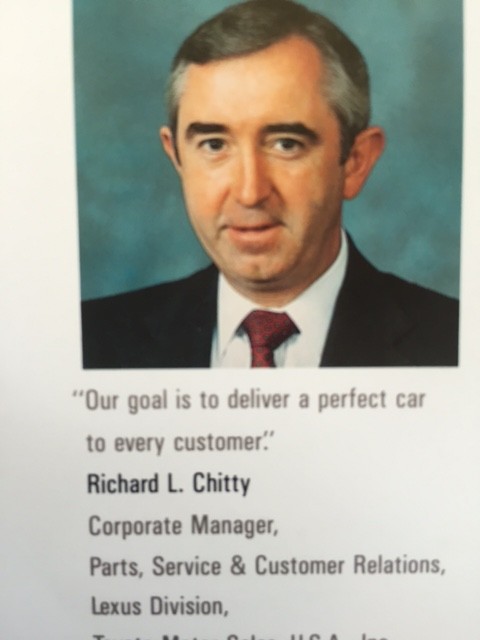Dick Chitty attended Pittsburg State University in Pittsburg, Kansas where he majored in automotive technology. After graduation, he applied for jobs at “the big three” auto companies, but could not get hired. He went to work in a gas station before becoming a high school automotive instructor in Minnesota. In 1977, he was hired by Toyota and worked as a field technical and training specialist before moving to the national office.

Dick Chitty grew up in the small southwest Iowa town of Sharpsburg, where his mother ran a grocery store and his father a gas station/auto repair shop. They didn’t have a lot of money, so Dick started working at a young age. His Methodist church upbringing and real-life experiences of working with people in a small town would prove invaluable. He had an unusual combination of technical skills and people skills that would be needed for Lexus to set a new industry standard for good customer satisfaction.
But what is good customer satisfaction? What does it look like, and how could we measure it? Dick knew that before we decided what good customer satisfaction was we needed to identify what it wasn’t. Customer satisfaction wasn’t a gimmick, a job, a computer report, or chasing numbers. Customer satisfaction wasn’t about cookies, 800 numbers to handle complaints, or follow-up calls. We didn’t want to make customer satisfaction a game for everyone, with the dealers creating elaborate schemes to cheat the system and hide problems. This would all be a waste of time, energy, and money.
We decided that customer satisfaction is about asking questions, listening carefully, analyzing, anticipating, watching for the little things, and exceeding “each” customer’s expectations. Customer satisfaction is about caring.
This would be known as “Lexus Cares.” It meant treating customers with respect and dignity and caring on a personal level—treating “each” customer as we would a guest in our own homes.
“Good comes to those…who conduct their business fairly.” Psalm 112:5 (NLT)
The internet was changing the face of the automobile business. Dick Chitty and the Japan staff were convinced that Lexus needed to be on the leading edge of this revolution in order to exceed customer expectations in service and parts. But the technology was risky and very expensive.
(To be continued in “The Data Dilemma”)
